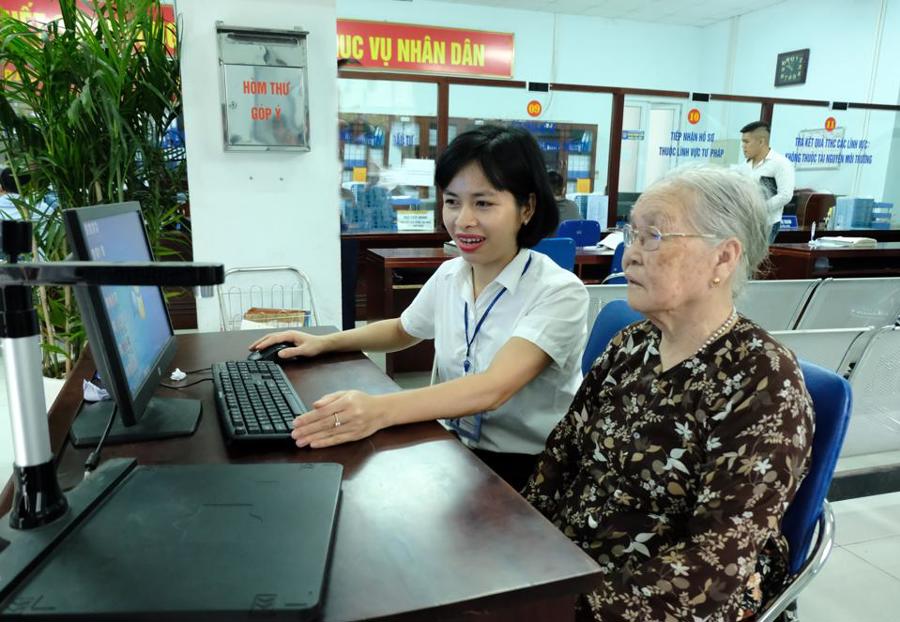 |
| Public servant assists locals in realizing public administrative procedures. Photo: Cong Hung/The Hanoi Times |
Hanoi has consistently been one of the country's leading provinces for economic development and other sectors. However, the city faces challenges due to its dense population and struggles with administrative reform, which has resulted in a historically low administrative reform index. Issues such as bureaucracy, corruption, red tape, and corruption that inconveniences citizens and businesses were a major concern for the city’s leaders in the past. The phrase "Hanoi is not in a hurry" is somewhat a reflection of this situation. Consequently, the city has made administrative reform a top priority in recent years and has implemented significant innovations.
In December 2023, the Hanoi People's Committee issued Decision No.6745/QD-UBND on the State Administration Reform Plan for 2024. It aims to streamline and efficiently operate state agencies at all levels, intensify digital transformation, and improve services for the public. Currently, all departments, districts, and towns have implemented the 2024 administrative reform plan, and the completion rate in the first quarter has met the set targets.
In the first quarter of 2024, the city issued 32 documents related to administrative management, administrative reform, and the implementation of one-stop-shop and interconnected services. The municipal People's Committee has also instructed agencies to review the implementation of simplified administrative procedures and the processing of citizens' applications and issued seven decisions on administrative procedures in various fields such as land, transportation, home affairs, labor and social affairs, intellectual property, and planning and investment.
Hanoi has also announced the cancellation of certain administrative procedures in areas such as labor and social affairs, transportation, forestry, meteorology, and hydrology, including the abolition of 73 procedures. Additionally, the city has introduced 94 internal procedures for resolving administrative matters in various fields.
The city implements one-stop-shop and interconnected services, ensuring that 100% of administrative procedures are received and processed under this model, with strict oversight. The administrative staff is carefully selected and trained to meet the required expertise and practical experience.
Hanoi has also handled and processed 384 administrative complaints and feedback submitted through various channels such as the hotline, Zalo, email, and the National Public Service Portal. On February 28, 2024, the People's Committee issued Plan No.72/KH-UBND to review, assess, and simplify administrative procedures and to enhance the quality of resolution procedures, including online evaluations.
Meanwhile, Hanoi has prioritized the development of e-government and digital governance as a key task in administrative reform. The city has completed several policies on data sharing and common storage infrastructure and has established digital infrastructure in state agencies. It is also making data available for city governance, boosting the digital economy, and increasing the province's digital transformation index. The People's Committee has enacted the Digital Transformation Index for state agencies and regulations for the management, use, and sharing of data, as well as guiding the implementation of community digital transformation groups.
The city continues to maintain a shared infrastructure, large systems for internal operations, centralized document and executive management systems at three levels, and online meeting systems for 579 communes, wards, and townships.
Nguyen Thi Tuyen, Deputy Secretary of the Hanoi Party Committee and Deputy Head of the Steering Committee of Program 01 of the Hanoi Party Committee stated that the city is focusing on building data centers for implementing e-government and smart operations centers, as well as developing electronic data. Notably, in the first quarter of 2024, the city accelerated the implementation of cashless payments for social welfare benefits, established electronic health records, paid pensions and social insurance benefits through cashless methods, digitized civil status records, and piloted cashless payments for parking fees.
The Party Committee directs the People's Committee to continue implementing Resolution No.11/NQ-CP dated January 30, 2022, of the Government on the Economic Recovery and Development Program, focusing on implementing policies to reduce land rent and water surface rent by 30% for units leasing land directly from the State.
The People's Committee also expedites the planning, evaluation, and approval of projects to quickly finalize the 2021-2025 medium-term public investment plan and initiate new projects eligible for funding.
The People's Committee focuses on restructuring organizations, tightening administrative discipline and compliance, clarifying the responsibilities of leaders, and increasing the use of information technology in management and operations to build digital governance. The city continues to improve and elevate its rankings in the PCI, PAR INDEX, PAPI, and SIPAS indices.
